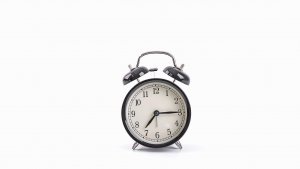Mark Vardy, author of the Productivityist Workbook says getting up early isn't all it's cracked up to be. In fact, being a night owl is a career choice, not a symptom of a chaotic lifestyle.
How To Hack The Day As A Night Owl
Mark Vardy, author of the Productivityist Workbook says getting up early isn't all it's cracked up to be. In fact, being a night owl is a career choice, not a symptom of a chaotic lifestyle.

There are numerous articles on the web where writers tell you that one of the best ways to become more productive is to get up early. By doing so, you get a jump-start on the rest of the world and reap the benefits of a quiet work environment—among other things.
Yet for the amount of articles about getting up early, there are many people who struggle to do just that. And I’m one of them.
I tried time and time again to get up early, to “reset my internal clock” to make that happen... and I wasn’t able to make it stick. While failure isn’t the worst thing in the world, after trying to become an early riser more times than I can remember, this quote came to mind:
"Insanity is doing the same thing over and over again and expecting different results." - Albert Einstein
Now I wasn’t doing the exact same thing each time I made an effort to change my sleeping and waking habits, but I realized that the act of trying to change my habits was the problem.
That’s where the insanity was coming into play. I was frustrated that I simply couldn’t do what I thought I should be able to do—and I couldn’t figure out why it wasn’t working. And then it came to me: I was not meant to be an early riser. I am a night owl—and I needed to embrace that rather than fight it.
Why It’s Okay to Be a Night Owl
Further to that, I examined how somebody who’s a night owl could essentially “hack their day” in the same way an early riser does. Perhaps not surprisingly, the same benefits that apply to early risers can belong to night owls too. Here are two examples of where this is true, when enough foresight and thought are used in the process.
1. Quiet Time. If you’re up past the bedtimes of those in your home, then you’re going to get the same sense of quiet that the early riser gets. I found that I’m at my best in a creative sense later in the day, once all of my essential actions and errands have been taken care of. I call it my “Finally Time”—as in I finally have the clarity of thought, quiet I need, and time I want to get my great work done.
2. Getting Ahead. While many are up at the crack of dawn and getting an early start to their day, I’m sleeping. And I’m no further behind because of it. I’m no less productive than the early riser because I did what they do in the morning hours during the late hours the day beforehand; I am being proactive in my own way. The notion that early risers are more productive than night owls is a myth. They just do “more productive” differently.
Now let’s look at another expression, one that is perhaps not so common.
"The early bird gets the worm but the second mouse gets the cheese." - Jeremy Paxman
To some that may mean that you should proceed with caution rather than be first into the fray, but I tend to look at it differently.
There is no advantage to being an early riser over being a night owl when it comes to increasing your productivity. It’s all in how you handle what comes at you—day and night—and making sure that you handle it in a way that suits you and your lifestyle. If you find that you like getting up early, go for it. If you don’t, then don’t change that.
Your body knows you better than the outside forces that compel you to get up early or stay up late do. It knows when you're at your peak and when you aren't. Listen to it and go with the flow.
Dealing With Your Body Clock
As I mention in my manifesto, The Way of The Productivityist, you shouldn’t fight your body clock. You need to listen to your mind and body and drive yourself to do more when it works for you. Don’t drive yourself insane trying to do anything that doesn’t. This exercise should help set you up to figure out what your body clock is trying to tell you.
Here’s the exercise:
1. Over the next 7 days, make note of when you wake up and when you go to bed.
2. Review your history and honestly describe yourself as one of the following: an early riser (regularly up and at ‘em before 7 a.m.) or a night owl (regularly up and at ‘em past
12 a.m.). Make a note of it in the space provided.
3. Now that you know what category you fit into (and if you fit into both, then you need to commit to one or the other—there is no middle ground here) and commit to sticking to those times for 30 days. This way you will build a consistent sleeping and waking habit that automates the process over the long haul.
Questions
1. Are you regularly up and at ‘em before 7 a.m.?
Turns out you’re an early riser. Ideally you should go to bed no later than 11 p.m every night.
2. Are you regularly up and at ‘em past 12 a.m.?
Turns out you’re a night owl. You should adjust your rising time to ensure you get at least 8 hours of sleep per night.
This is an extract from The Productivityist Workbook written by Mike Vardy. You can download the full eBook version today from OpenBooks.com by following this link. Read it, copy and share it with your friends, then decide if and how much you want to pay for it based on how much you feel the book is worth.
Thanks for signing up to Minutehack alerts.
Brilliant editorials heading your way soon.
Okay, Thanks!

